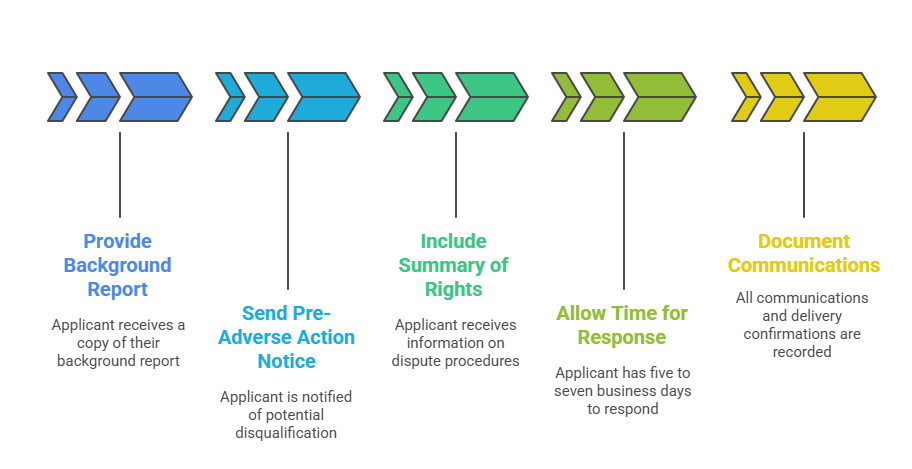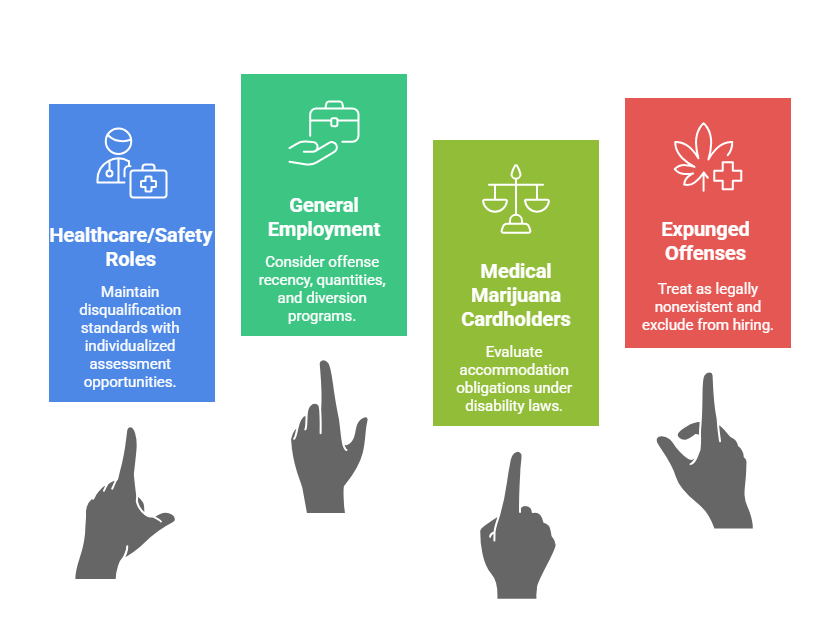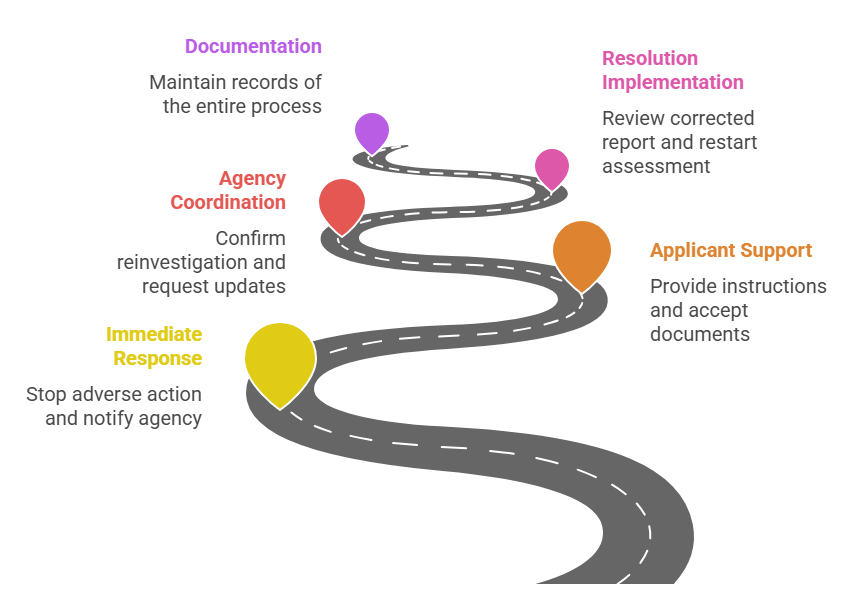Conducting a Florida criminal record search for employment requires navigating multiple state databases, understanding FCRA regulations, and complying with Florida-specific reporting restrictions that differ significantly from federal standards. This comprehensive guide provides hiring managers and HR professionals with actionable protocols for FDLE searches, multi-county verification strategies, and conviction-only reporting requirements that protect both employers and applicants in 2025.
Key Takeaways
- Florida employers must comply with both FCRA federal standards and state-specific background check laws that mandate written consent and adverse action procedures before disqualifying candidates based on criminal history.
- The Florida Department of Law Enforcement (FDLE) provides statewide criminal history searches, but comprehensive screening requires supplemental county-level checks in high-population areas like Miami-Dade, Orange, and Hillsborough counties.
- Florida follows a "conviction only" reporting model that prohibits including arrests without dispositions in employment background checks after specific timeframes, protecting applicant rights more stringently than many other states.
- Cannabis-related offenses in Florida have undergone significant reporting changes, with certain misdemeanor marijuana possession charges now eligible for expungement and exclusion from employment screening.
- Employers conducting Florida background check requirements must provide applicants with pre-adverse action notices, summary of rights documents, and a reasonable dispute period before making final hiring decisions.
- Non-compliance with FCRA Florida compliance standards can result in penalties ranging from $100 to $1,000 per violation, plus potential civil lawsuits and reputational damage for organizations.
Understanding Florida Criminal Record Search Employment Laws
Florida maintains a complex regulatory framework governing how employers access and use criminal history records during the hiring process. The state operates under dual compliance requirements that include federal Fair Credit Reporting Act standards and Florida-specific statutes. These layered obligations create challenges for employers who must understand both systems to conduct legally compliant background screening.
The foundation of Florida's employment screening system centers on the Florida Department of Law Enforcement database, which aggregates criminal records from law enforcement agencies across all 67 counties. However, FDLE records represent only one component of comprehensive due diligence. Many counties maintain separate judicial records systems with disposition information not immediately reflected in state databases.
Florida criminal history records accessibility changed substantially following legislative updates that strengthened applicant notification requirements. These 2025 standards require hiring managers to implement documented procedures covering consent collection, disclosure timing, and individualized assessments. Additionally, employers must establish dispute resolution processes that satisfy both state oversight agencies and federal enforcement priorities.
FCRA Florida Compliance Requirements for Employers
Federal and state laws work together to protect applicants during background screening processes. Employers must follow specific procedures to remain compliant. These requirements apply to all organizations conducting criminal record searches for employment purposes in Florida.
Written Authorization and Disclosure Standards
The Fair Credit Reporting Act mandates that Florida employers obtain clear written authorization before procuring consumer reports for employment purposes. This authorization must appear as a standalone document, not buried within general application materials or employment agreements. Employers cannot bundle consent forms with liability waivers or other legal documents that might obscure the specific permission being requested.
Florida regulations enhance federal standards by requiring additional disclosures about the scope and nature of criminal background investigations. Employers must inform applicants which databases will be searched and how criminal record information will influence hiring decisions. Transparency at this initial stage reduces dispute rates and demonstrates good-faith compliance efforts.
Pre-Adverse Action Process
When criminal record findings may result in an unfavorable employment decision, Florida employers must follow a structured pre-adverse action sequence. This process protects applicant rights while allowing employers to make informed hiring decisions. The waiting period gives applicants time to identify reporting errors.
The required pre-adverse action steps include:

- Providing the applicant a complete copy of the background report
- Sending a written pre-adverse action notice explaining potential disqualification
- Including a Summary of Rights document detailing dispute procedures
- Allowing five to seven business days before proceeding with final decisions
- Documenting all communications and delivery confirmations
After completing the pre-adverse action waiting period, employers who decide to proceed must issue a final adverse action notice. This document informs the applicant that their background check results led to the unfavorable decision.
Florida Department of Law Enforcement (FDLE) Search Protocols
The Florida Department of Law Enforcement maintains the state's central repository for criminal history information. Employers cannot directly access FDLE databases for pre-employment screening. Instead, they must work through authorized channels including fingerprint-based background checks or name-based searches performed by licensed consumer reporting agencies.
Accessing FDLE Criminal History Records
Fingerprint-based FDLE searches provide the most comprehensive and accurate results by matching unique biometric identifiers against the state criminal database. These searches eliminate name confusion issues and provide definitive identification, making them the preferred method for positions in healthcare, education, and childcare. Processing times typically range from 24 to 72 hours for electronic submissions.
Name-based FDLE searches offer a faster, less expensive alternative for general employment screening but carry inherent accuracy limitations. This creates potential for false positives when individuals share common names or false negatives when records contain spelling variations. Florida background check requirements generally accept name-based searches for non-regulated positions.
Multi-County Search Strategies for Comprehensive Screening
Florida's decentralized court system creates significant challenges for employers attempting comprehensive criminal background verification. The state's 67 counties operate independent judicial databases with varying levels of digitization and update frequencies. This fragmentation means that relying solely on statewide FDLE searches may miss recent charges or disposition updates.
High-population counties present particularly complex screening challenges due to case volume. Miami-Dade County alone processes over 300,000 criminal cases annually across dozens of courthouses. Orange County's tourism-driven transient population generates thousands of non-resident criminal cases. Hillsborough County's dual jurisdiction requires checking multiple court systems.
Effective multi-county strategies combine FDLE statewide searches with targeted county-level verification. The following screening approach balances comprehensiveness with cost-efficiency:
| County Tier | Search Protocol | Timeframe Coverage |
| Current Residence County | Direct court records search | 7 years or statutory limit |
| Previous Residence Counties | Direct court records search | 7 years or period of residence |
| Adjacent/High-Activity Counties | FDLE coverage + targeted verification | 7 years for felonies |
| Statewide Coverage | FDLE comprehensive search | All available records |
This tiered methodology ensures appropriate due diligence while avoiding excessive costs. Risk-based adjustments should increase county search scope for positions involving financial authority or access to vulnerable populations.
Florida's Conviction-Only Reporting Standards
Florida criminal record search employment practices operate under conviction-only reporting principles that restrict what information can appear in background checks. State law prohibits reporting arrests not followed by convictions after specific waiting periods. These restrictions protect individuals whose charges were dismissed or resulted in acquittals.
Understanding Reportable Offenses
The seven-year reporting limitation applies to most civil judgments, tax liens, and paid collections appearing in employment background checks. However, criminal convictions remain reportable indefinitely for most positions. Exceptions exist for certain expunged or sealed records that Florida law treats as legally nonexistent.
Records eligible for expungement or sealing under Florida statutes should not appear in compliant employment background checks. Applicants bear responsibility for completing the legal expungement process through the courts. Once granted, employers cannot consider sealed records in hiring decisions.
Pending Charges and Incomplete Dispositions
Florida background checks frequently reveal pending criminal charges without final dispositions. FCRA permits reporting pending charges but requires employers to conduct individualized assessments rather than automatic disqualifications. Florida case law establishes that rejecting applicants solely because of pending charges may constitute unlawful discrimination.
Best practices for handling pending charges include verifying current case status through county court records. For positions without direct nexus to the alleged criminal conduct, many Florida employers adopt conditional offer approaches that allow applicants to begin work while charges remain pending.
Cannabis Offense Reporting in Florida's Evolving Legal Landscape
Florida's changing approach to marijuana offenses has created significant implications for employment background screening. Recent Florida legislation expanded expungement eligibility for certain marijuana possession offenses, particularly first-time misdemeanor charges. Individuals who successfully complete pretrial diversion programs may qualify for record sealing.
Employers should implement clear, consistently applied policies addressing how cannabis-related offenses factor into hiring decisions:

- Healthcare and Safety-Sensitive Roles: Maintain disqualification standards for cannabis convictions within statutory lookback periods while providing individualized assessment opportunities.
- General Employment Positions: Consider offense recency, quantities involved, completion of diversion programs, and subsequent criminal history before making adverse decisions.
- Medical Marijuana Cardholders: Evaluate accommodation obligations under Florida disability laws while maintaining legitimate safety standards for positions with genuine requirements.
- Expunged Cannabis Offenses: Treat as legally nonexistent and excluded from hiring considerations per Florida sealing and expungement statutes.
Federal contractors and positions subject to Department of Transportation regulations face additional complexity because marijuana remains a Schedule I controlled substance under federal law.
Implementing Individualized Assessment Procedures
The Equal Employment Opportunity Commission's guidance emphasizes individualized assessment rather than blanket exclusion policies. Florida employers should adopt structured evaluation frameworks that consider the nature and gravity of offenses, time elapsed since convictions, and relevance to specific job duties.
Effective individualized assessments begin with clearly defined job-related screening criteria established before reviewing any applicant's background check results. Employers should identify which offense categories genuinely relate to essential job functions. Defensible lookback periods based on industry standards provide consistency.
When criminal record findings trigger concerns, employers should provide applicants opportunities to present mitigating information. Relevant mitigating factors include evidence of rehabilitation, employment history since conviction, and educational achievements. Florida's emphasis on second-chance hiring initiatives reinforces the value of considering applicant growth beyond their criminal history.
Industry-Specific Florida Background Check Requirements
Certain Florida industries face statutory criminal background check mandates that exceed general employment screening standards. Healthcare facilities must conduct Level 2 background screening for employees with direct patient access, including fingerprint-based FDLE searches and federal database checks. Educational institutions require similar comprehensive screening for instructional personnel.
Financial services positions involving access to customer accounts trigger enhanced due diligence requirements under banking regulations and FINRA rules. These screenings typically extend beyond standard seven-year lookback periods and include credit history reviews and regulatory sanctions checks. Florida employers in securities, banking, and insurance industries must coordinate background screening with licensing requirements.
Working with Consumer Reporting Agencies in Florida
Selecting an appropriate consumer reporting agency represents a critical decision for Florida employers implementing compliant background screening programs. Qualified screening companies should demonstrate deep familiarity with FCRA Florida compliance requirements and maintain direct access to county court records across high-population jurisdictions.
Effective consumer reporting agency partnerships begin with clear service agreements defining search scope, accuracy standards, and compliance responsibilities. Contracts should specify that the agency will apply Florida's conviction-only reporting rules and filter expunged and sealed records. Pricing structures should align with employer needsâwhether flat-rate packages for standard positions or tiered options for sensitive roles.
Florida employers should verify that screening vendors maintain appropriate certifications demonstrating compliance expertise. Professional Background Screening Association accreditation provides evidence of vendor quality. Regular vendor performance reviews examining accuracy rates and regulatory compliance metrics help identify potential issues before they escalate.
Record Retention and Documentation Best Practices

Florida employers must maintain meticulous records documenting all stages of the background screening process. These records provide essential evidence if regulatory agencies or applicants challenge hiring decisions. Retention periods must satisfy both federal requirements and Florida's four-year statute of limitations for civil rights violations.
Electronic record management systems offer significant advantages for organizing background screening documentation. These platforms should incorporate access controls limiting sensitive criminal record information to authorized personnel. Audit trails tracking who viewed applicant data provide accountability.
Comprehensive documentation requirements include:
- Pre-Screening Phase: Written authorization forms with applicant signatures, standalone disclosure documents, summary of rights notices
- Screening Phase: Complete background reports, dates reports were obtained, names of individuals who reviewed reports, internal assessment notes
- Adverse Action Phase: Pre-adverse action notice delivery confirmations, copies of reports provided to applicants, documentation of waiting periods
- Compliance Documentation: Vendor service agreements, staff training records on FCRA procedures, policy documents defining screening criteria
Maintaining these comprehensive records transforms compliance from a legal obligation into a strategic advantage.
Cost Considerations for Florida Employment Background Checks
Background screening costs vary significantly based on search comprehensiveness and turnaround time requirements. Basic Florida criminal history searches through name-based FDLE queries typically range from $15 to $35 per applicant. Adding multi-county court record verification increases costs by $10 to $25 per county searched.
Comprehensive packages including national criminal database searches and employment verification generally cost $50 to $150 per candidate. Fingerprint-based background checks required for healthcare and education carry higher price points. Level 2 screening packages combining Florida and federal fingerprint searches typically cost $75 to $150 per applicant.
High-volume employers can negotiate volume discounts that reduce per-screening costs while maintaining quality standards. However, employers should evaluate whether volume-based arrangements sacrifice search thoroughness. The true cost extends beyond direct vendor fees to include internal administration expenses for HR staff time and adverse action management.
Balancing Thorough Screening with Candidate Experience
Comprehensive Florida background check requirements create potential friction points in candidate experience, particularly when screening timelines delay hiring decisions. Forward-thinking employers recognize that screening processes communicate organizational values and significantly influence candidate perceptions.
Employers should clearly explain background check scope, typical timelines, and next steps when collecting authorization forms. Providing realistic expectations about potential delays helps maintain candidate engagement. Offering status updates during extended verification periods prevents talent loss to competitors.
Conditional offer approaches allow candidates to complete preboarding activities while background checks process. Technology investments can substantially improve screening efficiency through integrated platforms that allow applicants to complete authorization forms digitally. Mobile-friendly interfaces accommodate applicants without regular computer access.
Addressing Criminal History in Interviews and Applications
Florida employers must carefully navigate questions about criminal history during application and interview processes. Several Florida municipalities have adopted ban-the-box ordinances restricting when employers can inquire about convictions. While Florida lacks a statewide ban-the-box law, employers with operations in jurisdictions with such ordinances must comply with delayed inquiry timing requirements.
Even when permitted to ask about criminal history, employers should limit questions to convictions directly relevant to position requirements. Open-ended questions allowing applicants to provide context about older offenses reduce perceived bias.
Training hiring managers and interviewers on appropriate criminal history discussions prevents common compliance pitfalls:
- Prohibited Topics: Avoid asking about arrests without convictions, sealed or expunged records, or juvenile adjudications.
- Permissible Inquiries: Focus questions on job-related convictions, allow applicants to explain circumstances and rehabilitation efforts.
- Documentation Requirements: Note explanations applicants provide about offenses, record evidence of rehabilitation mentioned during interviews.
Documentation of criminal history discussions supports later individualized assessment processes.
Responding to Inaccurate Background Check Information
Despite consumer reporting agencies' accuracy obligations, Florida criminal record search employment processes sometimes generate reports containing errors. Common inaccuracies include misattributed offenses from individuals with similar names and outdated disposition information.
When applicants claim background report errors, employers should immediately pause adverse action timelines and notify the consumer reporting agency. FCRA requires screening companies to conduct reasonable reinvestigation within 30 days. Employers cannot proceed with candidate rejection based on disputed information until the reinvestigation completes.
The following resolution process ensures appropriate handling of disputed background information:

- Immediate Response: Stop adverse action timeline, document dispute details, notify consumer reporting agency within 24 hours
- Applicant Support: Provide dispute submission instructions, accept supporting documentation, maintain communication
- Screening Agency Coordination: Confirm reinvestigation initiation, request status updates, establish expected completion timeline
- Resolution Implementation: Review corrected report, restart individualized assessment if necessary
- Documentation: Maintain records of entire dispute process, corrective actions taken, final decision rationale
Supporting applicants through the dispute process demonstrates good faith and can preserve valuable talent.
Navigating Florida Expungement and Sealing Laws
Florida's expungement and record sealing statutes create opportunities for individuals to remove criminal history from public access. Expungement represents the most complete remedy, requiring destruction of criminal records held by law enforcement agencies, courts, and state repositories. Sealed records remain in restricted databases accessible only to criminal justice agencies.
Eligibility for expungement or sealing depends on offense type, disposition outcome, and prior criminal history. Generally, individuals qualify if charges were dismissed or resulted in acquittal for expungement. Sealing applies when adjudication was withheld and sentences completed.
Employers occasionally encounter situations where background checks reveal records that applicants claim were expunged or sealed. Employers should request documentation proving successful expungement, then work with consumer reporting agencies to verify current record status. Proceeding with adverse action based on properly sealed records exposes employers to FCRA violation claims.
Developing Comprehensive Background Screening Policies
Effective Florida criminal record search employment programs require documented policies establishing consistent procedures. Comprehensive screening policies should define which positions undergo background checks and specify search scope for different position types.
Policy development should begin with position-specific risk assessment. Entry-level positions with minimal liability exposure may require only basic criminal database searches. Executive roles warrant comprehensive multi-jurisdiction verification. Tiered screening protocols that match verification depth to position risk optimize resource allocation.
Policies must address the intersection of criminal history screening with other employment law obligations:
- Americans with Disabilities Act: Clarify that individualized assessment applies to disability-related offenses.
- Title VII Disparate Impact: Establish that screening criteria must be job-related and consistent with business necessity.
- State Fair Chance Hiring: Incorporate ban-the-box requirements for applicable jurisdictions.
- Industry Regulations: Address statutory screening requirements for healthcare, education, and financial services.
Regular policy review and updates maintain effectiveness as laws change.
Training HR Teams on FCRA and Florida Requirements
Comprehensive staff training represents the implementation cornerstone for effective Florida background check requirements compliance. HR professionals and hiring managers need thorough education on FCRA obligations. Training deficiencies create the most common compliance failures.
Initial training for new HR staff should cover fundamental concepts including the distinction between consumer reports and investigative consumer reports. Required authorization and disclosure procedures need detailed review. The complete adverse action process with specific timing requirements demands careful attention.
Ongoing education maintains compliance awareness as personnel encounter new scenarios. Quarterly updates highlighting recent case law keep teams informed. Annual refresher training reinforces core concepts. Specialized training for hiring managers should emphasize individualized assessment principles.
Liability Risks and Penalties for Non-Compliance
Florida employers face substantial liability exposure from background screening violations spanning FCRA penalties, discrimination claims, and negligent hiring lawsuits. FCRA establishes statutory damages of $100 to $1,000 per willful violation. Class action litigation can generate devastating financial exposure.
Discrimination claims based on improper criminal history screening practices create separate liability under Title VII and Florida Civil Rights Act. Disparate impact theories challenge policies that disproportionately exclude protected classes without documented job-related justification.
Negligent hiring liability represents the counterbalancing risk when screening programs fail to identify dangerous individuals. The following strategies reduce liability exposure:
| Risk Category | Mitigation Strategy | Implementation Requirements |
| FCRA Violations | Process compliance documentation | Documented procedures, regular audits |
| Discrimination Claims | Individualized assessment protocols | Job-related criteria, consistent application |
| Negligent Hiring | Comprehensive screening programs | Position-appropriate search depth |
| Inaccurate Reports | Quality vendor selection | Certified agencies, dispute resolution support |
Proactive risk management through these strategies costs far less than defending compliance failures.
Second-Chance Hiring and Fair Chance Initiatives
Second-chance hiring programs are gaining momentum as employers recognize the benefits of tapping talent pools historically excluded by blanket criminal history restrictions. Forward-thinking organizations are implementing fair chance hiring initiatives that evaluate applicants' skills and potential rather than automatically disqualifying based on past convictions.
Florida employers adopting second-chance approaches gain access to motivated workers while supporting broader criminal justice reform objectives. Ban-the-box initiatives continue expanding across Florida municipalities. Miami-Dade County's fair chance hiring ordinance prohibits conviction questions on initial applications.
Research demonstrates that individuals with criminal records who receive employment opportunities show lower recidivism rates. Implementing supportive onboarding programs helps formerly incarcerated individuals navigate workplace expectations successfully. These comprehensive approaches benefit both employers seeking reliable talent and communities working to reduce reoffending rates.
Continuous Monitoring and Ongoing Screening Considerations
Some Florida employers implement continuous background monitoring programs that periodically re-screen existing employees for new criminal activity. This approach helps organizations identify concerning conduct in safety-sensitive industries. Healthcare facilities, educational institutions, and financial services firms frequently utilize ongoing monitoring.
Continuous monitoring raises significant privacy concerns that employers must address through transparent policies. Initial authorization forms should disclose that background screening may continue throughout employment. Employers must establish documented procedures for responding when new criminal records emerge.
The frequency of ongoing screening varies based on industry requirements:
- Annual Rescreening: Comprehensive background checks conducted yearly for employees in highly regulated positions.
- Event-Driven Screening: Background verification triggered by employee transfers to roles with greater responsibility.
- Quarterly Monitoring: More frequent automated database checks for positions with ongoing regulatory compliance obligations.
Employers should balance monitoring frequency against position risk levels and budget constraints.
Conclusion
Conducting compliant Florida criminal record search employment procedures requires balancing comprehensive due diligence against applicant fairness protections. Successful screening programs combine FDLE statewide searches with strategic multi-county verification, apply Florida's conviction-only reporting standards accurately, and implement individualized assessment procedures. Employers who invest in robust policies, qualified consumer reporting agency partnerships, thorough staff training, and meticulous documentation create defensible screening programs.
The regulatory landscape governing Florida background check requirements continues evolving through legislative updates and shifting enforcement priorities. Employers must maintain ongoing compliance awareness and regularly update screening policies. Organizations that view compliance as a strategic investment position themselves for sustainable success in attracting qualified talent while minimizing legal liability in 2025's complex employment screening environment.
Frequently Asked Questions
What is the difference between FDLE criminal searches and county court record checks in Florida?
FDLE searches query Florida's central criminal history repository, providing statewide coverage of arrests and convictions. County court record checks access specific judicial databases containing detailed case information and dispositions not always transmitted to FDLE. Employers should combine both search types for comprehensive screening.
How long do background checks take for employment purposes in Florida?
Standard name-based Florida criminal background checks typically process within 1-3 business days, while fingerprint-based FDLE screening completes within 3-5 business days. Multi-county court record searches can extend timelines to 5-10 business days depending on jurisdiction.
Can Florida employers automatically reject applicants with criminal records?
Florida law does not prohibit blanket exclusion policies for most private employers, but EEOC guidance recommends individualized assessment to avoid Title VII liability. Certain regulated industries have statutory disqualifications, while ban-the-box jurisdictions require case-by-case evaluation.
What criminal records can be reported on Florida employment background checks?
Florida background checks can report convictions indefinitely for most positions, with seven-year limitations applying to non-conviction records and certain misdemeanor convictions for lower-salary positions. Expunged and sealed records should not appear on compliant reports.
Do I need an applicant's consent to run a background check in Florida?
Yes, FCRA requires employers to obtain clear written authorization from applicants before procuring background reports. This consent must appear on a standalone document separate from employment applications, and employers must provide disclosure documents explaining the screening process.
How do expunged records affect Florida employment background checks?
Properly expunged Florida criminal records should not appear on employment background checks as state law requires destruction of arrest and court records following successful expungement. If expunged records appear due to database errors, employers cannot legally consider this information.
What are the penalties for violating FCRA requirements in Florida?
FCRA violations can result in statutory damages ranging from $100 to $1,000 per willful violation, plus actual damages, punitive damages, and attorney's fees. Class action lawsuits can generate substantial financial exposure for employers with systemic compliance failures.
Are marijuana convictions still reportable on Florida employment background checks?
Yes, marijuana-related convictions remain reportable unless successfully expunged or sealed through court proceedings. While Florida has expanded medical marijuana access, cannabis remains illegal under federal law, and employers in safety-sensitive industries typically maintain disqualification standards.
Additional Resources
- Florida Department of Law Enforcement - Criminal History Information
https://www.fdle.state.fl.us/Criminal-History-Records - Federal Trade Commission - Using Consumer Reports: What Employers Need to Know
https://www.ftc.gov/business-guidance/resources/using-consumer-reports-what-employers-need-know - Equal Employment Opportunity Commission - Background Checks and Employment
https://www.eeoc.gov/laws/guidance/arrest-and-conviction-records - Florida Department of Economic Opportunity - Employment Law Resources
https://floridajobs.org/business-growth-and-partnerships/for-employers/understanding-florida-employment-law - Professional Background Screening Association - FCRA Compliance
https://www.psbassociation.org/fcra-compliance - National Consumer Law Center - Fair Credit Reporting Act Manual
https://www.nclc.org/resources/fair-credit-reporting-act-manual - Society for Human Resource Management - Background Checks and State Laws
https://www.shrm.org/topics-tools/tools/toolkits/background-check-state-laws

GCheck Editorial Team
Meet the GCheck Editorial Team, your trusted source for insightful and up-to-date information in the world of employment background checks. Committed to delivering the latest trends, best practices, and industry insights, our team is dedicated to keeping you informed.
With a passion for ensuring accuracy, compliance, and efficiency in background screening, we are your go-to experts in the field. Stay tuned for our comprehensive articles, guides, and analysis, designed to empower businesses and individuals with the knowledge they need to make informed decisions.
At GCheck, we're here to guide you through the complexities of background checks, every step of the way.






